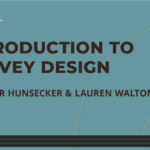
JENNIFER HUNSECKER
Nielsen
LAUREN WALTON
Nielsen
[s2If current_user_can(access_s2member_level1)]
[/s2If]
[s2If !is_user_logged_in()]
Please sign in or become an EPIC Member to access video.
[/s2If]
[s2If current_user_is(subscriber)]
Become an EPIC Member to access video:
→ Learn about Membership
→ Browse Video Library
[/s2If]
Overview
Ethnographers tend to be uneasy about survey research. Some of us shun it because it seems “reductive” of human experience; others are intimidated by complex methods and analytics that weren’t part of our research training. But surveys are everywhere—some are rigorous and insightful, many are lousy. Whether we’re conducting surveys, collaborating with colleagues who do, or interpreting survey-based studies, an understanding of survey research fundamentals is essential.
Tutorial offers survey basics from an ethnographer and survey methodologist who collaborate at the world’s leading provider of media and marketing information. Their crash course on survey fundamentals...




